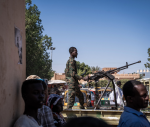You are here
For Nigeria’s schools, safety must come first
Mar 20,2024 - Last updated at Mar 20,2024
EDINBURGH — More than 280 Nigerian students were kidnapped earlier this month from their school in Kuriga, a town in the northern state of Kaduna, the second mass abduction of young Nigerians in the span of a week. The international community must urgently act to secure the release of these children, some of whom are as young as eight years old. But equally important is creating safer schools for students throughout Nigeria’s 36 states, so that all children can pursue an education without fear of abduction or violence.
The kidnapping in Kuriga was even larger than Boko Haram’s infamous raid on a girls’ secondary school in Chibok, a town in north-eastern Borno State, in 2014. The Islamic militants kidnapped 276 girls; a decade later, nearly 100 of them are still missing. Armed groups have targeted many schools in the intervening years, although not on the scale seen in the Kuriga attack, which took place only days after militants seized dozens of displaced people, reportedly including many young women and girls, in the Borno town of Gamboru Ngala.
The international community can and must help. First and foremost, the Nigerian government needs surveillance support to locate the abducted pupils. As the United Nations Special Envoy for Global Education, I am in contact with governments and urging them to help determine the students’ whereabouts, with a view to their quick release.
But, more broadly, as terrorism continues to plague the region, and as the risk of kidnapping and violence climbs, more and more parents may decide to keep their sons or daughters at home. This is unacceptable. No child should have to fear going to school, and no parent should have to worry that their child may never return.
As my experience has shown, there are ways to ensure that students can continue to attend school safely. I have been involved in numerous initiatives around the world focused on improving school safety, not least in Nigeria after the Chibok kidnapping. In response to the growing number of attacks, I visited the country on numerous occasions to advise successive presidents. Moreover, I worked with a coalition of Nigerian business leaders and the Global Business Coalition for Education to launch the Safe Schools Initiative at the World Economic Forum in May 2014. It aimed to implement best practices, based on global standards, including school- and community-level actions and special provisions for schools in high-risk areas.
I believe that these same measures must be reintroduced, reinvigorated and supercharged at the federal, state, and local levels in Nigeria. Technical support and national and international funding must be increased and made widely available to ensure that schools receive significant security and safety upgrades. This will allow us to reassure Nigerian parents that schools can be safe places to learn.
Four broader initiatives, which together serve as a comprehensive blueprint for safe schools, should be implemented urgently. For starters, the international community must engage Nigerian governors and intergovernmental forums to enhance intelligence sharing and security ties. Second, state-by-state school-safety plans, including detailed proposals for building walls and fencing and introducing state-of-the art telecommunications connections and security alarms that can be easily implemented, must be developed and presented publicly.
Third, investment in community outreach and engagement programs will be essential, as will close collaboration with community and religious leaders to explain how schools are being better protected, and how important it is for children to continue to attend. Lastly, policymakers must empower local people to form school-based management committees and make their own decisions about how best to protect students and teachers according to local circumstances and needs.
Many Nigerian parents are currently facing a no-win situation: send a child to school and risk them being abducted, or keep a child out of school and risk them forgoing a better future. That is why my message to these children, and their parents, is that if you make the effort to come to school, we will strive to ensure that your learning environment is more secure. Nigerians have suffered greatly from school interruptions caused by terrorist attacks and threats. It is now time for the international community to show solidarity and support efforts to make schools safer. That is the only way to realise the promise of a high-quality education for all.
Gordon Brown, a former prime minister of the United Kingdom, is United Nations special envoy for Global Education and chair of Education Cannot Wait. Copyright: Project Syndicate, 2024. www.project-syndicate.org













Add new comment